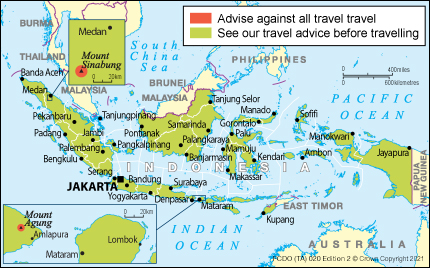Indonesia
Summary

The Foreign, Commonwealth & Development Office (FCDO) advises against all travel to:
- within 5 km of the Mount Sinabung crater in Kalo Regency, North Sumatra
These are exclusion zones put in place by the local authorities due to ongoing volcanic activity. If you’re in either exclusion zone, you should leave immediately. See Mount Sinabung
COVID-19 entry restrictions for Indonesia
Before you travel, check the ‘Entry requirements’ section for Indonesia’s current entry restrictions and requirements. These may change with little warning. Monitor this advice for the latest updates and stay in contact with your travel provider.
Travelling from and returning to the UK
Check what you must do to travel abroad and return to England, Scotland, Wales or Northern Ireland.
If you plan to pass through another country to return to the UK, check the travel advice for the country you’re transiting. If you will pass through a red list country, book your hotel quarantine package before travelling to the UK.
If you’re planning travel to Indonesia, find out what you need to know about coronavirus there in the Coronavirus section.
During the COVID-19 pandemic, it is more important than ever to get travel insurance and check it provides sufficient cover. See the FCDO’s guidance on foreign travel insurance.
For information about COVID-19 vaccines, see the Coronavirus page.
Around 390,000 British nationals visit Indonesia every year.
Early on Monday 7 December 2020, an incident occurred between the police and supporters of Habib Rizieq Shihab, leader of the Islamic Defenders Front (FPI), on the Cikampek motorway just outside of Jakarta, in which six FPI supporters were shot dead. In recent weeks, since Rizieq’s return to Indonesia, there have been confrontations between large crowds of his supporters and the police in the vicinity of Rizieq’s home in the Petamburan area of Tanah Abang, Central Jakarta.
Violent protests have taken place in Manokwari, West Papua Province and in Jayapura and Wamena, Papua Province during August and September 2019. You should monitor local media, follow the advice of local authorities, and avoid large gatherings in public areas, including demonstrations and political rallies, as they could become violent with little notice. See Papua and West Papua
There were nationwide protests in Indonesia by students against new draft legislation on 24 September 2019. These have the potential to reoccur. You should avoid large gatherings in public areas, including demonstrations and political rallies, as they could become violent with little notice. See Political situation
Terrorists are very likely to try to carry out attacks in Indonesia. Terrorist groups continue to plan attacks and have the capacity and intent to carry out these attacks at anytime and anywhere in the country. Types of attacks have included suicide bombing and small-arms fire, targeting public and crowded places. Be vigilant and take care. There is a heightened risk during holiday periods, including those with a religious focus. You should exercise extra caution at these times. See Terrorism
You should exercise caution when travelling to Aceh, Central Sulawesi Province (especially Palu, Poso and Tentena), Maluku Province (especially Ambon), Papua and West Papua Province due to potential for violence or violent conflict. See Local travel
Forest fires continue to burn in Indonesia’s forest and peatlands, mostly on Sumatra and Borneo, generating widespread haze that can affect air quality. You should monitor air quality during your visit and follow medical advice where appropriate. See Health
There are many active volcanoes in Indonesia, any of which can erupt with little or no warning. This often results in the evacuation of villages within a 3 to 7 km radius and disruption to air travel in the wider region. In the past, repeated eruptions have caused destruction and fatalities. Check media reports before travelling to areas that are prone to volcanic activity. The local alert level may change at short notice. Take extra care and follow the advice of local authorities, including respecting any exclusion zones. See Natural disasters
A number of areas across Indonesia, including in Central Sulawesi, Lombok and the Sunda Strait, are continuing to recover from the impact of earthquakes and/or tsunamis in 2018. If you’re travelling to affected areas, you should exercise caution, particularly around damaged buildings and the most affected areas. See Earthquakes and tsunamis
UK health authorities have classified Indonesia as having a risk of Zika virus transmission. For more information and advice visit the National Travel Health Network and Centre website for travel to Indonesia - including Bali, for travel to Indonesia - Borneo.
Possession, trafficking and manufacture of drugs are serious offences in Indonesia. Some offences carry the death penalty. Do not get involved. See Local laws and customs
There have been a number of deaths and cases of serious illness of tourists in Indonesia, caused by drinking alcoholic drinks contaminated with methanol. See Methanol poisoning
If you’re abroad and you need emergency help from the UK government, contact the nearest British embassy, consulate or high commission. Consular support may be limited in parts of Indonesia given the size of the country and the remoteness of some areas.
To contact the emergency services call 111 or 112 (police), 118 or 119 (ambulance and rescue) or 113 (fire).
To contact the tourist police in Bali call 0361 7540599 or 0361 224111. To contact the tourist police in Jakarta call 021 526 4073.
The Overseas Business Risk service offers information and advice for British companies operating overseas on how to manage political, economic, and business security-related risks.